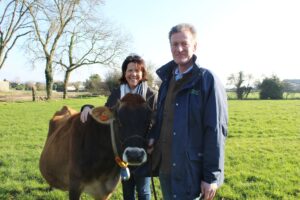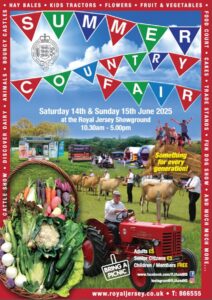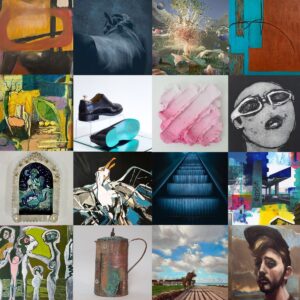
In 2016 Philip Gray retired from his teaching post at Victoria College and with his wife, the artist Anna (Le Moine Gray), bought a dilapidated old farmhouse in a remote part of western Brittany. He has sent us an update on their life in what they call ‘Cap Eden’
‘DEMAT‘ FROM RURAL BRITTANY!
FOUR years ago we bought a tumble down farmhouse that had not been lived in for 30 years; covered in ivy and brambles; full of junk and rubbish; one part had a pine tree collapsed on the roof, another had so much water through the roof that the first floor had completely collapsed; three parts were designated as agricultural and there was no guarantee that we could live in them; the large hangar was collapsing and the roof was of a concrete/asbestos mix that would cost a fortune to remove.
What had we done?
Well, four years on our home is almost finished but there is still much to do. Landscaping and general tidying up is needed to eradicate the building site feeling that still lingers. The last house made ready for use was the oldest; a small cottage that must have been the first human habitation before the 18th Century. It is now Anna’s studio. Perhaps we had our priorities askew and it should have been renovated first! At long last Anna now has her own personal space and is so happy to be immersed again in her work.
We are now looking after nearly 30 acres of wild rural land and often I feel as though we are on our own little island. We have the sea on one side of us, but on the other three sides you have to go some distance to find agricultural land that is ploughed, furrowed and chemically sanitised to produce crops of the ‘correct’ quality – fields of all shades of artificial greens.
Many years ago our land was used for dairy cows, then pigs and then cows again; now we have a small collection of our own animals, but our fields have no added chemicals and we have flourishing wildlife.
Indeed, soon after we moved in an apiarist approached us to ask if he could bring his beehives to our fields as his honey was beginning to taste of chemicals. We now have a small collection of hives and his very distinctive little black ‘Ouessant bees are very happy in the surrounding fields full of wildflowers and flowering trees.
We have been much influenced by reading the book ‘Wilding’ by Isabella Tree (that Anna found out about in a Rural Jersey article). Her definition of rewilding is ‘to stimulate something interesting for nature with the tools we have left to us, in the environment in which we now find ourselves’. In the book, they were dealing with 3500 acres, so obviously, our rewilding project is on a much smaller scale but we feel that we can still make an impression. When we first saw the property we were struck by how quiet it was – too quiet and no bird sound at all. Now we hear insects, birds and animals. Roe deer have recognized a sanctuary here and their barking calls are frequent. We hear birds all day and finish with the churring of nightjars in the early evenings.

Of course, using no chemicals means that we need to deal with some toxic plants in the fields where they maybe a danger to our animals if eaten or left to dry up in the hay. We need to control the natural processes as little as possible but we still have to deal with bracken and ragwort as well as keeping thistles out of the fields, all by hand. I have bought a hand sickle that has proved invaluable but I must now track down a long-handled scythe to make the work less back breaking.
Some of our fields also have the added complication of being under regulations by which you cannot use any machinery between the end of March and July in order to protect wildlife. I am completely sympathetic to this reasoning but one of our fields is full of broad-leaved dock and we have no choice but to continually cut out the woody stems by hand, as they make the hay unpalatable for animals.
Gradually new habitats are evolving and we see a strengthening and varied wildlife. We have constructed a catalogue of wildflowers that cannot hope to be exclusive (Anna makes a drawing of each one as she finds them). My ornithological skills are more adept however and I have already identified 54 species here. The most exotic were a pair of black woodpeckers who stayed for a few days last year. I have also set myself a task of photographing all the butterflies of our land; the swallowtail is a stunning member amongst over 20 species… we are encountering more each day.
The flocks of linnets and goldfinches, as well as the clouds of meadow brown butterflies rising from the long grass as we stroll through it go some way to making us believe we are doing something right. We have swallows nesting of course and we get as much pleasure from listening to their chattering as we do from startling a woodcock in the valley.
Our old concrete piggery pens have had their uses as areas to quarantine our ‘Landes de Bretagne’ (THE rare Breton sheep) when they have been sick but also to allow two injured roe deer to recuperate after traffic accidents. They are the chosen home to our two rather wild cats.
Not all our energies will be on our rewilding project. We have planted an orchard and raised vegetable beds will go in this autumn. We are creating a little country garden with our favourite roses and we have many trees in mind that we want to plant. However, choices of new shrubs and bushes will be made according to their attractiveness for butterflies and birds.
‘What had we done?’ we asked ourselves four years ago.
Well, we had bought an amazing property with around 15 acres of wild land, 200 yards from a coastal footpath.
‘Cap Eden’ bears out the truth of the phrase: ’location, location.’ It has become our home.





